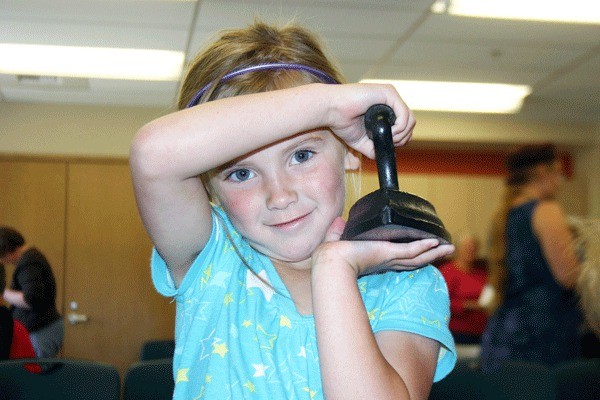Rangers from Ebey’s Landing National Historic Reserve asked the kids of Central Whidbey to do the impossible this week; imagine a Coupeville without Kapaw’s Iskreme or the Honey Bear.
On Wednesday, dozens of school children gathered to learn about the island’s first settlers at the Coupeville Library. Ranger Alik Roos told the children that many of Whidbey’s pioneers traveled for years before settling on the prairie. She explained that many families had to leave their prized possessions like pianos, sewing machines and furniture behind because the items proved to be too heavy to carry in the wagons.
Roos read a letter that was written from the perspective of an 11-year-old boy named Alexander to his cousin living on the East Coast. The letter talked about how his young sisters were always busy helping their mother prepare meals and wash clothing and how he and his brothers were expected to help out on the farm. He described how dangerous it was to ride horseback among the roaming wolves at night and how trips to the doctor meant calling on a man at his home. Roos pointed out the differences and similarities between the pioneers and the children’s lives.
“Pioneers couldn’t buy clothes from the store,” Ranger Sally Straathof added after showing the kids some examples of traditional pioneer dress borrowed from the Island County Historical Museum. “They could buy material from the mercantile.”
Straathof told the attentive kids that the pioneers had to make almost everything for themselves and since they had so few resources to work with, many things were plain and lacking color.
“All of you like toys,” Straathof said. “Well, kids in the 1860s weren’t any different. They had handmade toys all over the house. That’s what they had to work with. They didn’t have a lot of money.”
Straathof shared a small wooden rocking horse with the children, marbles made out of dried clay and a cloth doll. She let the kids take turns spinning a top and watched as they tried to figure out an unfamiliar string toy.
Roos asked the kids about their favorite play things, and many of their responses were items made of plastic and sleek electronics.
“Can you imagine not having a computer?” Roos asked. “Or riding a horse to school? It might sound fun, but it was a lot of work.”
Nine-year-old Coupeville Elementary School student Hannah Shinn shared what she knew about explorers Lewis and Clark with the group and talked about how the women in those days made clothing and blankets out of wool and dyed the fabric with berries.
“If I lived back then, I would sew everything,” Hannah said. “I learned all about the pioneers in school. It was really cool and interesting.”
After the rangers’ presentation, the children were asked to create a store that might have been useful to the pioneers.
Five-year-old Cayla Turner said she learned that “the pioneers went camping,” so she decided to make them a “store, a hotel and a new bedroom.” She drew a rainbow colored building.
The rangers’ talk was part of the Sno-Isle Libraries educational series for children and young adults that will continue throughout the summer. See upcoming events at www.sno-isle.org.



